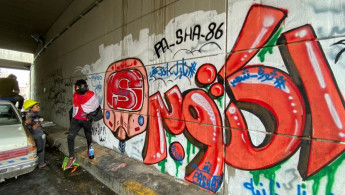HRW condemns sentencing Iraqi activist for three years over a Twitter post
The Human Rights Watch (HRW) and Iraqi civil society activists condemned the Iraqi judiciary for sentencing activist Hayder Finjan al-Zaidi to three years in prison for a Twitter post and expressed concern that the move is an alarming escalation of legal threats against civil society.
Al- Zaidi was found guilty by a Baghdad-based criminal court on Monday for alleged criticism against Abu Mahdi al-Muhandis, the former deputy of Iran-backed Popular Mobilization Forces (PMF), an umbrella group of mostly Shia paramilitaries. Al-Muhandis and Iranian Islamic Revolutionary Guard Corps (IRGC) – Quds Force commander Qassem Soleimani were killed when their convoy was hit by a US airstrike on 3 January 2020.
According to a decision by Al-Rasafa's first criminal court and as per a complaint by the PMF, Zaidi has been sentenced to three years in prison under article 226 of the Iraqi penal code, which prohibits "publicly insulting" state institutions with a sentence not exceeding seven years in prison.
The sentence is subject to review by Iraq's appellate courts.
الشاب حيدر الزيدي ينحكم 3 سنوات بسبب منشور ينتقد بي الحشد .
— Ali Fadhil _ علي فاضل (@ali_alifadhil) December 5, 2022
بينما نوري المالكي شتم الحشد و اسماهم أمة الجبناء أمة الحشد ما ينحكم و لا يتحاسب .
للتذكير في هذا الجزء من التسريب اهان المالكي الحشد و الدفاع وباقي الاجهزة الامنية .#الحرية_لحيدر_الزيدي pic.twitter.com/kW4uv43Ss3
A relative to Zaidi has told The New Arab's Arabic sister site Al-Araby Al-Jadeed that Zaidi was arrested in June by security forces related to the PMF and was freed on bail after 16 days and exposed to physical torturing for ten days.
"On 6 June, authorities detained the activist, Hayder Finjan al-Zaidi, 20, based on a Twitter post he allegedly made that month but released him on bail after 16 days. He and his father Hamid, 66, deny that he posted the criticism, insisting that his Twitter account was hacked," the HRW said in a statement.
"The authorities should immediately release al-Zaidi and halt all prosecutions that infringe on defendants' basic rights and scrap the law that criminalizes criticizing public officials."
Adam Coogle, deputy Middle East director at Human Rights Watch further said, "Regardless of who posted the Twitter message, the Iraqi justice system should not be used as a tool to suppress peaceful criticism of the authorities or armed actors."
"It is a sad reflection on the rule of law in Iraq that an activist like al-Zaidi gets three years in prison for a Twitter post he says he didn't write while dozens of officials and armed groups enjoy impunity for killing activists and protesters," he said.
"Al-Zaidi should not spend another second in jail following his patently unfair trial," Coogle added.
The Iraqi judiciary is often suspected of being partial to the country's ruling elites.
Iraqi journalist-in-exile Ali Fadhil, who had leaked audio recordings by Nuri al-Maliki, the head of the State of Law coalition, tweeted that Zaidi has been imprisoned for criticising the PMF, while Al-Maliki who had called the PMF "cowards" for not being held accountable was left untouched.
"The one who stole US$2.5 billion [from the tax authority] was released on bail," Zaidi's father told the HRW, comparing his son's case to the case of Noor Zuhair Jassim, one of the main suspects in a rampant corruption case in the country dubbed as, 'the theft of the century.'
"Meanwhile, my son was sentenced to three years in prison for a Twitter post he didn't even write," Zaidi's father added.
Iraq's prime minister Mohammed Shia' al-Sudani on 28 November said that about 182.7 billion Iraqi dinars (over US$125 million) has been recovered from Jassim and then he has been released on bail as per court orders.
More than 800 protestors were killed by Iraq's security forces and militias during the October 2019 protests. Thousands of others were injured, while tens of journalists and activists were killed over the past years as the perpetrators are enjoying state-sponsored impunity.






 Follow the Middle East's top stories in English at The New Arab on Google News
Follow the Middle East's top stories in English at The New Arab on Google News
![The UAE is widely suspected of arming the RSF militia [Getty]](/sites/default/files/styles/image_330x185/public/2024-11/GettyImages-472529908.jpg?h=69f2b9d0&itok=Yauw3YTG)
![Netanyahu furiously denounced the ICC [Getty]](/sites/default/files/styles/image_330x185/public/2024-11/GettyImages-2169352575.jpg?h=199d8c1f&itok=-vRiruf5)
![Both Hamas and the Palestinian Authority welcomed the ICC arrest warrants [Getty]](/sites/default/files/styles/image_330x185/public/2024-11/GettyImages-2178351173.jpg?h=199d8c1f&itok=TV858iVg)